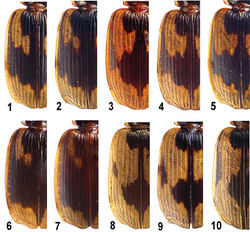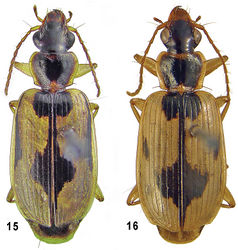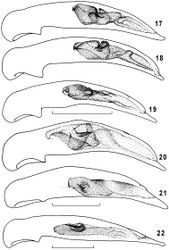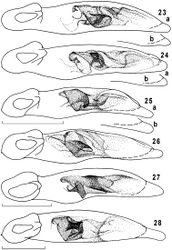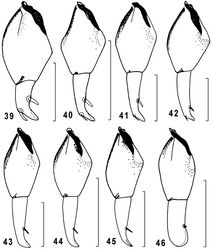Taridius disjunctus
| Notice: | This page is derived from the original publication listed below, whose author(s) should always be credited. Further contributors may edit and improve the content of this page and, consequently, need to be credited as well (see page history). Any assessment of factual correctness requires a careful review of the original article as well as of subsequent contributions.
If you are uncertain whether your planned contribution is correct or not, we suggest that you use the associated discussion page instead of editing the page directly. This page should be cited as follows (rationale):
Citation formats to copy and paste
BibTeX: @article{Fedorenko2012ZooKeys244, RIS/ Endnote: TY - JOUR Wikipedia/ Citizendium: <ref name="Fedorenko2012ZooKeys244">{{Citation See also the citation download page at the journal. |
Ordo: Coleoptera
Familia: Carabidae
Genus: Taridius
Name
Taridius disjunctus Fedorenko sp. n. – Wikispecies link – ZooBank link – Pensoft Profile
Description
Body (Fig. 16) subconvex, 8.2–8.9 mm in length. Dorsum black, moderately shining. Elytral dark pattern (Fig. 8) with slight but distinct bronzed luster, strongly reduced laterally: DSS rounded, with inner four intervals involved in, emarginate at DSF which running on sutural interval only, DMS expanded outwards as far as stria 5, DLS reduced to a very small median patch on interval 7 or also on 8. Underside colored as in Taridius ornatus. Microsculpture sharp on elytra, moderately sharp over pronotum and head, superficial to obsolete on neck.
Eyes slightly reduced, genae rather long and oblique but not projecting, head broadest in anterior third of eye tubercle length; frontal carinae mostly three, among them inner one shorter and shallower anteriorly. Vertex rather convex, neck-constriction distinct.
Pronotum 1.16–1.23 (mean 1.19, n=3) times as wide as head, 1.31–1.36 (mean 1.33) times as wide as long, basal margin a little convex backwards or its straight medial part slightly surpassing lateral parts, these oblique and increasingly curved forwards; sides sinuate or barely so before obtuse or highly obtuse hind angles. Front transverse impression obliterate, basal transverse impression rather deep, wide, deeper laterally, forming a rather deep, oblique pit at bottom of fairly large basal fovea which is separated from disc by a paralateral line traceable in basal half to two thirds. Both basal and anterior borders entire. Transverse rugosities rather dense and sharp, more so in basal foveae. Punctation invisible or very sparse along reflexed side margin only.
Elytra rather convex, 1.47–1.55 (mean 1.52) times as long as wide, 1.77–1.89 (mean 1.84) times as wide as pronotum, apices truncate and a little obtuse; apical truncature conspicuously sinuate before rather distinct though obtusely rounded outer angles. Striae indistinctly crenulate, intervals subequally wide and almost flat. Last abdominal sternite quadrisetose in female.
Penis (Figs 21, 27) with a very large, triangular, apical lamella (the penis is poorly sclerotized because of an immature condition of the only male examined). Female gonocoxite and gonosubcoxite IX stout, the former with strong ensiform setae (Fig. 39).
Diagnosis
This species is close to Taridius wrasei and perhaps also Taridius pahangensis, with which it shares such characters as similar body shape and elytral color pattern, as well as a conspicuous dorsal microsculpture. Yet it differs from both in the larger body, entirely black abdomen and strongly reduced, almost indistinct, DLS, from the former also in the smaller eyes with oblique genae, the more convex elytra and a particular structure of both male and female genitalia.
Material
Holotype ♀, S[outh] Vietnam, Lam Dong Prov. / Bi Doup – Nui Ba [Nature] Reserve / 12°07'N, 108°39'20"E / Bi Doup Mt., N. slope / h = 1700–1900 m [asl], 10.IV.2008 / leg. D Fedorenko. Paratypes, ♂, same locality, but env. Long Lanh, 12°10'44"N, 108°40'44"E / h = 1400–1600 m [asl], V.2009; ♀, Vietnam, Dak Lak Prov. / Chu Yang Sin Natn. Park / 12°23'48"N, 108°20'59"E, Krong Kmar riv., upper flow / h = 1000 m [asl], at light, 30.III–14.IV.2012 / leg. D Fedorenko.
Geographic distribution
Lam Dong and Dak Lak provinces, Vietnam.
Original Description
- Fedorenko, D; 2012: Notes on the genus Taridius Chaudoir, 1875 (Coleoptera, Carabidae, Lebiini), with descriptions of six new species from Vietnam ZooKeys, 244: 67-89. doi
Images
|
